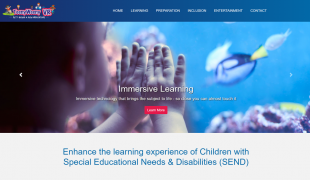- 6662
- 508
- 7
- 7
- 0
- Help Ukraine
About the solution
The app consists of a game for individuals with Autism and other special needs to recognize emotions to help improve social skills by recognizing the emotion, the cause behind the emotion and speedup recognition. It has great geography fun as well as the user takes train trips around the world.
Focused on a passenger train traveling to destinations around the world, the game requires players to match a specified emotion with the correct picture of the passenger's facial expression.
Autistic people have trouble understanding the difference between a smile and frown, and the emotions behind the expressions.
“The game is designed not only to help children with autism improve their emotion recognition, but better understand the meaning behind the expression and interpret expressions more quickly”, Therese Wantuch said.
"It helps them answer the question, 'Why are they happy or why are they sad?' " she said.
From her experience with her son, who was diagnosed at 18 months, Therese Wantuch said she knows firsthand the difference early intervention can make with children with autism.
"When he was diagnosed, we went all out," she said. "My husband went part-time with his job. We did all the programs. One was called floor time, and we spent at least 20 minutes a day just getting in his face and working with him on verbal skills."
The skills learned from Training Faces are paramount for children with autism to become more independent adults, she said.
"As the diagnosis of autism continues to go up, we need these folks to be independent," she said. "It's what gives them a fuller a life, and lets them get decent housing on their own and get a job so they're not sitting in Mommy and Daddy's family room their entire life. That's not fair to them or their family."
This games costs $2.99. A percentage of each download of the app goes to Autism charities.
Adapted from: https://usat.ly/2upNDUy
More info: http://apple.co/2tDjqmd
https://www.youtube.com/watch?v=Dbqp1PYl56o
This solution shall not include mention to the use of drugs, chemicals or biologicals (including food); invasive devices; offensive, commercial or inherently dangerous content. This solution was not medically validated. Proceed with caution! If you have any doubts, please consult with a health professional.
DISCLAIMER: This story was written by someone who is not the author of the solution, therefore please be advised that, although it was written with the utmost respect for the innovation and the innovator, there can be some incorrect statements. If you find any errors please contact the patient Innovation team via info@patient-innovation.com
-
-
519
-
0
-
7226

Mother develops app for patients with autism
COMMUNICATION: Communicating, whether by speaking, listening, or other means
Social interaction
Autism
Asperger's Syndrome
App (Including when connected with wearable)
Anxiety
Difficulty concentrating or making decisions
Social withdrawal or isolation
Depressed Mood
Restlessness or feeling slowed down
Loss of interest or pleasure in activities (anhedonia)
Hallucinations (perceiving things that aren't there)
Managing Neurological Disorders
Improving Speech and Communication
Caregiving Support
Child and Adolescent Psychiatry
General and Family Medicine
Psychiatry
United States
-
-
-
415
-
0
-
4754

Teeny Weeny VR- a new way of terapy for autistic children.
CAREGIVING
COMMUNICATION: Communicating, whether by speaking, listening, or other means
Autism
AI algorithm
Anxiety
Difficulty concentrating or making decisions
Social withdrawal or isolation
Promoting self-management
Managing Neurological Disorders
Building Supportive Community Relationships
Promoting inclusivity and social integration
Improving Speech and Communication
To improve Treatment/Therapy
Preventing (Vaccination, Protection, Falls, Research/Mapping)
Raise awareness
Caregiving Support
Child and Adolescent Psychiatry
General and Family Medicine
Neurology
Pediatrics
Psychiatry
United Kingdom
-
-
-
802
-
0
-
17628

Proloquo2Go – App to help people communicate
CAREGIVING
COMMUNICATION: Communicating, whether by speaking, listening, or other means
Social interaction
Paralysis
Autism
Cerebral Palsy
Brain Stroke
Brain Injury (Abscess, Brain Barrier Defect, Brain Contusion, Brain Hemorrhage, Brain Edema)
Assistive Daily Life Device (to help ADL)
Assistive Technology access
App (Including when connected with wearable)
Tremors
Muscle cramps or spasms
Difficulty coordinating movements
Muscle weakness
Difficulty speaking or understanding speech
Trouble with fine motor skills (e.g., writing, buttoning clothes)
Twitching or involuntary movements (myoclonus)
Acquired language impairment (Aphasia)
Promoting self-management
Managing Neurological Disorders
Building Supportive Community Relationships
Promoting inclusivity and social integration
Improving Speech and Communication
Caregiving Support
Clinical Pathology
Medical Genetics
Neurology
Pediatrics
Rheumatology
Netherlands
-
 en
en